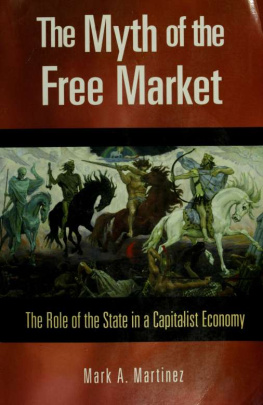The Bottom Line
Unfortunate Side Effects of Capitalist Culture
Arthur McGovern
Nichols College
Vernon Series in Critical Perspectives on Social Science
Copyright 2017 Vernon Press, an imprint of Vernon Art and Science Inc, on behalf of the author.
All rights reserved. No part of this publication may be reproduced, stored in a retrieval system, or transmitted in any form or by any means, electronic, mechanical, photocopying, recording, or otherwise, without the prior permission of Vernon Art and Science Inc.
www.vernonpress.com
In the Americas: Vernon Press 1000 N West Street, Suite 1200, Wilmington, Delaware 19801 United States | In the rest of the world: Vernon Press C/Sancti Espiritu 17, Malaga, 29006 Spain |
Vernon Series in Critical Perspectives on Social Science
Library of Congress Control Number:
ISBN: 978-1-62273-284-5
Product and company names mentioned in this work are the trademarks of their respective owners. While every care has been taken in preparing this work, neither the authors nor Vernon Art and Science Inc. may be held responsible for any loss or damage caused or alleged to be caused directly or indirectly by the information contained in it.
Table of Contents
Chapter 1 Capitalism and society
Introduction
Market Logic
Modernity and the Rise of Modern Problems
Technocracy and Instrumentality
Colonization by the Capitalist Market
Money
Alienation
Summary Thoughts
Chapter 2 The Role of Culture
Culture
Frames and Ideas
The Strategic Use of Framing
Ideologies
Capitalism as Ideology
Individualism
Homo Economicus: The Ideal Man
Summary Thoughts
Chapter 3 The Power and Problems of Capitalism
Winners and Losers
Historical Context
Market versus State Capitalism
Neoliberalism, or the Sad State of American State Capitalism
Capitalism and Social Justice
Externalities
A Global Issue
Perverse Industries
The Illness Industry
Big Pharma and Little Kids
For-Profit Law Enforcement
Summary Thoughts
Chapter 4 Consumption Problems
Permissive Politics
From Puritanism to Consumerism
The Symbolism of Consumption
Consumer Identity as Social Identity
Economic intrusions
Marketing and Manipulation
Commodifying Culture
Anomie
Summary Thoughts
Chapter 5 Manipulation, Mass Media, and Democracy
Democracy and the Public Sphere
Media and the Public Sphere
The Media and Elitism
Elitism
Knowledge and Power
Passive Democracy and Political Illusions
Illusions of Representation
Illusions of Public Participation
Summary Thoughts
Chapter 6
References
Index
Capitalism and society
Introduction
This book is about the influence of the capitalist economic system on cultural values and rules here and abroad. One basic assumption that informs this work is that the globalized economic system is based on rational, but necessarily amoral goals and values, while the social and cultural world of human interactions is not. For example, remember when you were a child you learned that all human life was precious? Well, how precious? The answer matters and its not useful to simply claim that its priceless. For one thing, the value determines how much spending the government will require from businesses in the form of regulations and safety standards to prevent a human death. This value is calculated by many government agencies in the U.S. and varies, but has generally increased over time. In 2011, for example, the U.S. Transportation Department valued a human life at around $6 million to justify new regulations for the automotive industry (Applebaum, 2011). Businesses also make these types of calculations, but often use different valuations and for other purposes. One American car manufacturer, for example, estimated that a human life was worth about $200,000, in the context of a wrongful death associated with their product. In that case, one of the largest American auto manufacturers knew for several decades that the placement of the fuel tank in one particular model created an unreasonable risk of exploding in the event of a rear collision (Geyelin, 1999). Internal memos released into evidence in 1998 showed that the company estimated that deaths resulting from post-collision fuel-tank fires would cost the company $2.40 per car, based on an estimate that each life has a value of $200,000. Other memos showed that the company had developed an improved design for protecting the gas tank in collisions, but would cost the company $8.59 per car. The company executives decided not to make the improvement.
We recognize that corporations are guided by rational values and tend to make these kinds of quantifiable calculations in order to reduce risk, manage costs, generate profits, and promote growth. But if unchecked, such analyses suggest a dark and dangerous future when many pro-business advocates argue against any regulations at all. The problem here is not capitalism as an economic system it is surely the most efficient system for the production and distribution of goods and services. But the economic system has no role to play in the civic, moral, or personal circumstances of human life without degrading those circumstances. The question posed by many scholars like the philosopher Michael Sandel is whether some aspects of human life are immune to economic calculation. In other words, whether there are some things that money cant buy (Sandel, 2012). For example, during the AIDS epidemic in the 1980s, entrepreneurs saw an opportunity to capitalize on the high mortality rates among victims by investing in viatical settlements. Viatical settlements involve the sale of a persons life insurance policy once they become chronically or terminally ill. Basically, an insured victim gets an immediate cash payout by naming the investor as the beneficiary of the policy, and the investor agrees to pay for medical care until the victims death. In 1989, two investment firms specifically targeted individuals with advanced cases of AIDS for viatical settlements; by 1994, the industry had grown to some 60 firms (Atkinson & Gilkeson, 1998). The risk for the investor was how long the AIDS victim lived; the longer they survived the less profit the investor would realize. In this industry, the inescapable conclusion is that the investor has a financial interest in the prompt death of the insured. There have been some phenomenal returns, and there have been some horror stories where people live longer, said the president of one viatical company (quoted in Sandel, 2012). My argument isnt with the fact that this happens but that too many of us consider this to be a normal part of life. My concern is that if the market continues to rationalize these sorts of relationships between people, where one persons illness is another persons investment opportunity, then the logical conclusions are harrowing: Free markets for kidneys and other organs, various forms of slavery or indentured servitude, predatory for-profit healthcare. The problem is that the economic marketplace is morally neutral at best, since value is calculated in monetary terms, and this means that the further the market reaches into our civic and personal spaces, the less influ ence that moral and social values will have. This, I contend, is just one of the unfortunate side-effects of capitalist culture.









